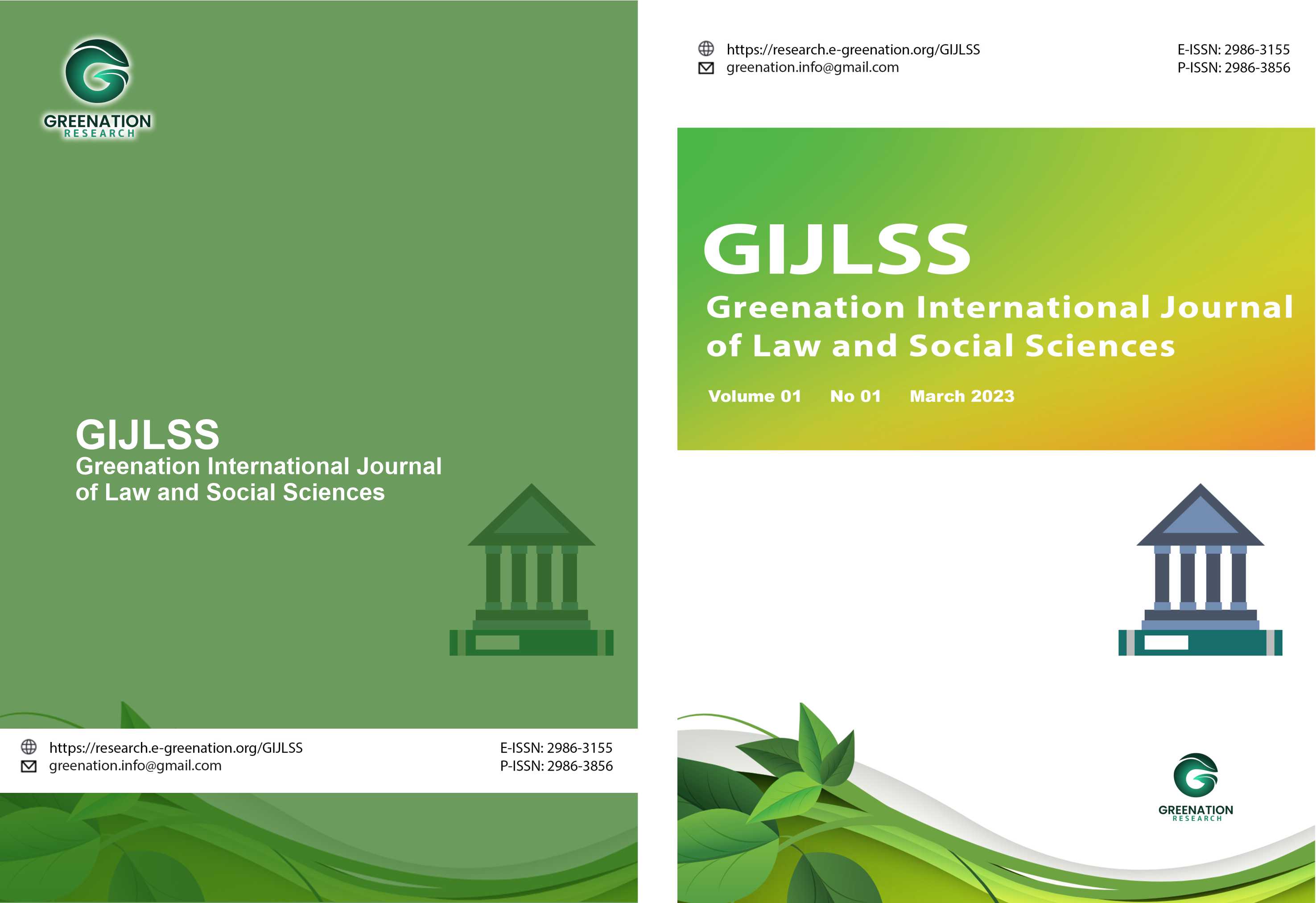Legal Analysis of the Supervisory Mechanism of the Korwas PPNS Polri on the Implementation of Coercive Measures in the Investigation Process to Ensure Compliance with the Principle of Due Process of Law
DOI:
https://doi.org/10.38035/gijlss.v3i2.486Keywords:
Korwas PPNS, Coercive Measures, Due Process Of Law, Legal Supervision, InvestigationAbstract
Fair and just law enforcement requires that every investigation process is subject to the principle of due process of law, including when coercive measures are taken by Civil Servant Investigators (PPNS). In this context, supervision by the Indonesian National Police through the Supervisory Coordinator (Korwas) mechanism is crucial to ensure that the implementation of investigations by PPNS does not deviate from criminal procedure law and does not violate human rights. This study aims to legally analyze the Korwas POLRI supervision mechanism for the implementation of coercive measures by PPNS and the extent to which such supervision ensures compliance with the principle of due process of law. The research method used is a normative legal approach by analyzing relevant laws and regulations such as Law Number 8 of 1981 concerning Criminal Procedure Law, Law Number 2 of 2002 concerning the Indonesian National Police, and Regulation of the Chief of the Indonesian National Police Number 20 of 2010 concerning Coordination, Supervision, and Guidance for PPNS. The study results indicate that although the supervisory mechanism has been regulated normatively, there are still weaknesses in technical implementation in the field, especially related to reporting, coordination between agencies, and protection of suspects' rights in the early stages of the investigation. It is recommended that there be regulatory reform, increased supervisory capacity, and the use of digital technology to support accountability and transparency of the investigation process by PPNS. Thus, Korwas supervision can function optimally in ensuring a legitimate, fair investigation process that upholds human rights.
References
Aprilia, S. S. (2023). Perlindungan Hukum Terhadap Hak Tersangka Melalui Upaya Praperadilan. PAMPAS: Journal of Criminal Law, 4(1), 16-32.
Basuki, D. (2021). Paradoks Penyidik Pegawai Negeri Sipil Dalam Sistem Peradilan Pidana Indonesia. Jurnal Penelitian Hukum Legalitas, 15(2), 65-74.
DM, M. Y. (2024). Analisis Terhadap Pembatasan Dan Pengawasan Kewenangan Kepolisian Di Indonesia. Milthree Law Journal, 1(2), 149-180.
Fernando, Z. J. (2021). Due Process of Law dalam Penanggulangan Tindak Pidana di Indonesia. Majalah Keadilan, 21(1), 67-89.
Fitrah, F. A. (2021). Kedudukan penyidik pegawai negeri sipil Direktorat Jenderal Pajak dalam kerangka penegakan hukum pidana perpajakan di Indonesia. SIGn Jurnal Hukum, 3(1), 1-25.
Hairi, P. J. (2021). Putusan Mahkamah Konstitusi Terkait Kewenangan PPNS dalam Penyidikan TPPU dan Implikasinya Terhadap Penegakan Hukum. Negara Hukum: Membangun Hukum untuk Keadilan dan Kesejahteraan, 12(2), 161-180.
Haniyah, H. (2024). Legal Reconstruction of Error in Persona Cases: Justice Enforcement Challenges Based on Due Process of Law Principle. Reformasi Hukum, 28(3), 168-186.
Hapsoro, F. L. (2023). Akuntabilitas Penegakan Hukum Terhadap Aparat Kepolisian yang Melakukan Tindak Kekerasan. Jurnal Hukum Ius Quia Iustum, 30(3), 602-621.
Hasibuan, E. S. (2025). PENGUATAN POLRI DALAM PPNS: ELABORASI PENYIDIK POLRI DENGAN PENYIDIK PEGAWAI NEGERI SIPIL (PPNS). Jurnal Kajian Ilmu Kepolisian dan Anti Korupsi, 2(1), 37-46.
Ismoyo, J. D. (2025). Teori Negara Hukum Modern. Jambi: PT. Sonpedia Publishing Indonesia.
Kambu, W. M. (2021). Tinjauan Yuridis Tentang Hak Asasi Manusia Berdasarkan Pasal 28d Ayat 3 Undang-Undang Dasar 1945. Lex Et Societatis, 9(1), 23-31.
Kusuma, F. K. (2021). PERAN PPNS (PENYIDIK PEGAWAI NEGERI SIPIL) DALAM PENEGAKAN PERDA SEBAGAI PENYIDIK DALAM TINDAK PIDANA TERTENTU DENGAN PERATURAN PERUNDANG–UNDANGAN YANG MENJADI DASAR HUKUMNYA. Jurnal Media Ilmiah, 15(9), 5228.
Latukau, F. (2019). Kajian Progres Peranan Kepolisian Dalam Sistem Peradilan Pidana. Tahkim, 15(1), 1-15.
Mappatunru, A. M. (2023). Hukum Acara Pidana Seri:" Penyelidikan, Penyidikan Dan Upaya Paksa". Yogyakarta: Deepublish.
Nasution, A. H. (2022). The Authority of Civil Service Investigators (PPNS) in the Law of the Republic of Indonesia No. 8 of 1981 concerning the Criminal Procedure Code in Article 1 Paragraph (1) Jo. Article 6 Paragraph (1) and Law No. 19 of 2019 concerning Criminal Acts of Corr. FOCUS: Journal of Social Studies, 3(2), 92-101.
Nasution, R. P. (2024). Praktek Due Process Of Law Dalam Sistem Peradilan Pidana Indonesia di Tinjau Dari Putusan Pengadilan Negeri Medan Tahun 2022-2023. Jurnal Begawan Hukum (JBH), 2(1), 117-128.
Noor, A. &. (2025). URGENSI DAN TANTANGAN UPAYA PAKSA (DWANG MIDDELEN) DALAM PENEGAKAN HUKUM DI INDONESIA. JURNAL JURISTIC, 5(1), 1-9.
Nurhaqi, A. (2020). Implementasi Konvensi Anti Penyiksaan Dan KUHAP. HERMENEUTIKA: Jurnal Ilmu Hukum, 4(2), 132-139.
Sendow, R. I. (2024). EFEKTIVITAS UPAYA PAKSA (DWANG MIDDELEN) DALAM PELAKSANAAN SISTEM PERADILAN PIDANA PADA TINGKAT PENYIDIKAN. LEX CRIMEN, 12(5).
Sutrsino, A. (2025). Peran Hakim dalam Mewujudkan Due Process of Law Pada Sistem Peradilan Tata Usaha Negara di Indonesia. Locus: Jurnal Konsep Ilmu Hukum, 5(1), 17-28.
Yuliniar, S. (2023). Analysis of Problems of Oversight of the Constitutional Court. JUSTICES: Journal of Law, 2(1), 47-56.
Downloads
Published
How to Cite
Issue
Section
License
Copyright (c) 2025 Ridho Perasetia, Joko Setiono, Albertus Wahyu Rudhanto

This work is licensed under a Creative Commons Attribution 4.0 International License.
Copyright :
Authors who publish their manuscripts in this journal agree to the following conditions:
- Copyright in each article belongs to the author.
- The author acknowledges that the Greenation International Journal of Law and Social Sciences (GIJLSS) has the right to be the first to publish under a Creative Commons Attribution 4.0 International license (Attribution 4.0 International CC BY 4.0).
- Authors can submit articles separately, arrange the non-exclusive distribution of manuscripts that have been published in this journal to other versions (for example, sent to the author's institutional repository, publication in a book, etc.), by acknowledging that the manuscript has been published for the first time at GIJLSS.























